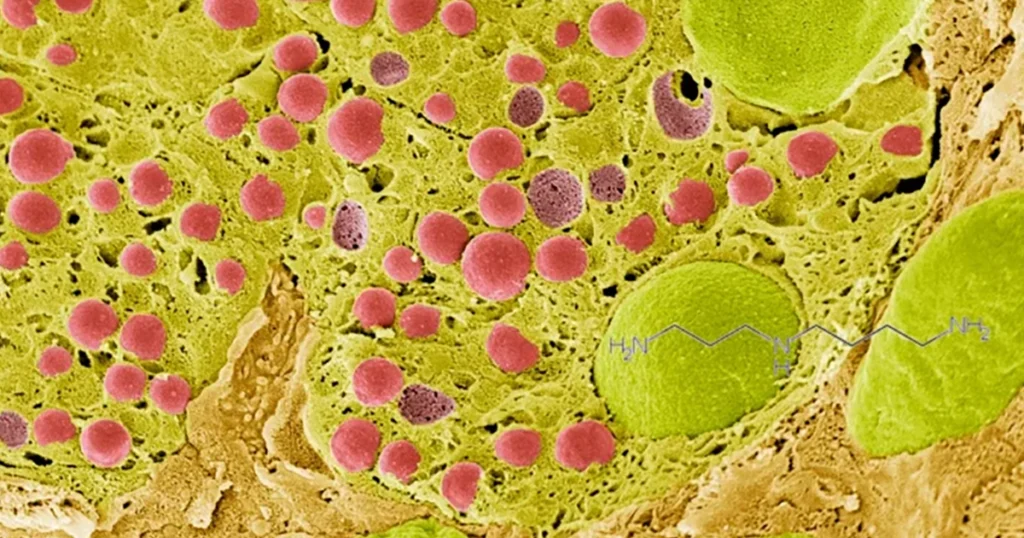Health and Wellness
The Role of Spermidine in Autophagy
In the microscopic world of cells and molecules, some discoveries seem more like science fiction than reality. One such molecular miracle is autophagy, a process by which cells internally recycle their own components to maintain homeostasis and respond to stress. As scientists delve deeper into the study of autophagy, they uncover surprising connections with various molecules. One of them is spermidine, a natural compound present in our cells. In this article, we will explore the fascinating role of spermidine in autophagy and how it affects our health and longevity.
Understanding Autophagy
Autophagy, derived from the Greek words for “self-eating,” refers to the process by which cells break down and recycle their own components. This naturally occurring phenomenon can be likened to a cellular housecleaning process, removing damaged and unnecessary cellular parts to make way for healthy, functioning elements. It is crucial for maintaining cellular health and function, facilitating cellular repair, and responding to stress.
The mechanisms of autophagy are still being explored, but it’s known that this process is critical to human health and disease. Dysregulated autophagy has been linked to a range of conditions, including neurodegenerative diseases, cancer, and aging. Understanding the pathways and molecules involved in autophagy could illuminate new treatment strategies for these conditions.
The Link with Spermidine
Spermidine, a naturally occurring polyamine found in various foods and in our cells, has emerged as a significant player in the process of autophagy. Scientists have discovered that spermidine can induce autophagy by interacting with various intracellular targets. This ability to kickstart cellular recycling makes spermidine an important molecule for maintaining cellular health and combating disease.
Surprisingly, spermidine levels decrease as we age. This decrease correlates with a reduction in autophagic activity, which leads to an accumulation of damaged cells and contributes to the aging process. By understanding the relationship between spermidine and autophagy, scientists hope to develop interventions that can boost levels of spermidine and promote cellular recycling.
Enhancing Cellular Recycling
Increasing evidence suggests that enhancing autophagy through spermidine supplementation could offer a host of health benefits. This is because spermidine doesn’t just induce autophagy; it enhances the entire cellular recycling process, leading to improved cellular function and health. This effect has been demonstrated in several studies, where spermidine supplementation led to increased autophagic activity and, consequently, enhanced cellular health.
This enhanced cellular recycling could have significant implications for disease prevention and treatment. By improving the cellular housecleaning process, spermidine could help prevent the build-up of damaged cellular components that contribute to a wide range of diseases, from neurodegenerative conditions to cancer.
Cardiovascular Health Benefits
Spermidine’s ability to enhance autophagy also offers cardiovascular benefits. Studies suggest that spermidine supplementation can improve heart health by reducing blood pressure, improving arterial health, and reducing the risk of heart disease. These effects are likely due to spermidine’s role in autophagy, which helps to prevent the buildup of damaged cells in the cardiovascular system.
Additionally, by stimulating cellular recycling, spermidine helps to maintain the health and function of the heart itself. In animal studies, spermidine supplementation has been shown to prolong lifespan by reducing heart-related mortality, highlighting the significant role spermidine and autophagy play in cardiovascular health.
Neuroprotective Effects
The benefits of spermidine and autophagy extend beyond the heart and into the brain. Neurodegenerative diseases like Alzheimer’s and Parkinson’s are characterized by the accumulation of damaged cells and proteins in the brain. By boosting autophagy, spermidine can help clear these harmful components, providing a protective effect against neurodegenerative disease.
Moreover, studies in aging mice have demonstrated that dietary supplementation with spermidine can enhance cognitive function and memory. The neuroprotective role of spermidine could therefore have significant implications for preventing cognitive decline and promoting brain health in aging populations.
Implications for Aging and Longevity
The ability of spermidine to enhance autophagy and promote cellular health has significant implications for aging and longevity. By preventing the buildup of damaged cells, spermidine could slow the aging process at the cellular level. This, in turn, could help prevent age-related diseases and extend lifespan.
Studies in yeast, flies, worms, and mice have shown that spermidine supplementation can extend lifespan, proof of the powerful potential of spermidine and autophagy in promoting longevity. In humans, diets rich in spermidine are associated with lower mortality rates, suggesting that we may be able to harness the power of spermidine to enhance our own longevity.
The world of cells and molecules may sound like the domain of science fiction, but it is very real and crucial to our health and longevity. As research continues to unravel the intricate dance of molecules like spermidine and processes like autophagy, we begin to see the profound implications of these cellular mechanisms on our health.
Here’s to the promise of spermidine and autophagy, and to the exciting future of health and longevity research that awaits us.


